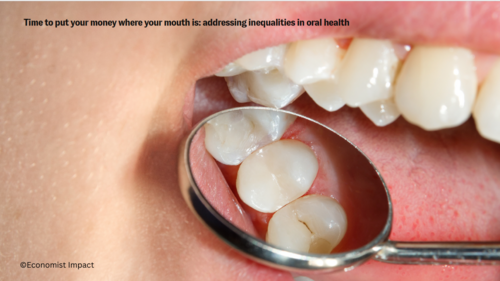![]()
8 March 2024
EFP white paper: The high cost of oral health inequality in Brazil
Categories:Institutional, Publications

The recently launched EFP white paperTime to put your money where your mouth is: addressing inequalities in oral health estimated the burden of caries and periodontitis in six countries. Written and published by the Economist Impact, a “caries prevention and care cost calculator” was developed and included in the report.
In the coming weeks we will focus on each of the countries presented in the white paper commissioned by the EFP and supported by Haleon.
In Brazil, the economic and social implications of dental caries, a highly preventable disease, reveal a stark picture of health inequality that demands urgent attention. The EFP white paper delves deep into the costs associated with dental caries management and the alarming disparities in oral health outcomes across different socioeconomic groups within the country.
Brazil faces a staggering economic burden due to dental caries, with direct treatment costs soaring to $36.23 billion among the population aged 12-65. These costs reflect a range of treatments, from fillings at $69 per tooth to implants costing as much as $540, underscoring the financial challenges many Brazilians face in accessing proper dental care. The report illuminates the profound impact of socioeconomic status on oral health, revealing that individuals in the most deprived quintiles bear the brunt of these costs, with the most deprived facing an average lifetime cost per person of $22,903, significantly higher than their less deprived counterparts.
The average Decayed, Missing, and Filled Teeth (DMFT) index among 12-year-olds illustrates a clear gradient of oral health inequality. Children from the most deprived backgrounds exhibit the highest DMFT scores, indicating a greater burden of disease. This disparity not only reflects the immediate impact of caries but also signals long-term health and economic consequences for these individuals and their communities.
The root causes of these disparities are multifaceted, involving lower awareness of oral self-care, higher consumption of sugary foods and beverages, and limited access to preventive measures such as fluoridated toothpaste and professional dental care. Brazil's fluctuating approach to the taxation of Sugar-Sweetened Beverages (SSB) and the challenges in implementing widespread water fluoridation further complicate efforts to curb the prevalence of dental caries.
The report also highlights the social implications of oral health disparities, with untreated caries linked to lower social capital among adolescents. This connection between poor oral health and reduced social participation, empowerment, and networks underscores the broader societal impact of oral diseases beyond individual health outcomes.
"The profound impact of dental caries on the health and economic well-being of Brazilians, especially those from deprived backgrounds, cannot be overstated,” said Sergio Kahn president of the Brazilian Society of Periodontics and Implantology. “The EFP white paper highlights an urgent need for a collective effort towards preventive care. Oral health must no longer remain in the shadows. We need better education for both professionals and the public, as well as better access to oral care.”
Addressing these challenges requires a multifaceted approach, shifting from a restorative model of dental care to one that prioritises prevention. This shift involves not only educating dental professionals and the public about the importance of oral health but also implementing population-level prevention measures to bridge inequalities. The Brazilian government's efforts, such as the distribution of tooth brushing kits and the incorporation of oral health education into broader public health campaigns, represent steps in the right direction.
Yet, the persistence of health inequalities and the ongoing economic burden of oral diseases highlight the need for more aggressive action. Policies that address the commercial determinants of health, such as the marketing and consumption of sugary products, alongside investments in community-wide prevention programmes, are critical to reversing the tide of oral health disparities in Brazil.
In conclusion, the EFP white paper serves as a call for stakeholders across the spectrum, from policymakers to healthcare providers, to invest in and prioritise preventive oral health measures. Nicola West, EFP secretary general, who initiated and contributed to the report urged policy makers and budget holder to prioritise oral health: “There is no health without oral health,” she said. “Health does not start in hospital”
By addressing the root causes of oral health inequalities and embracing a preventive care model, Brazil can mitigate the economic and social costs of dental caries and move closer to achieving universal oral health care for all its citizens.




